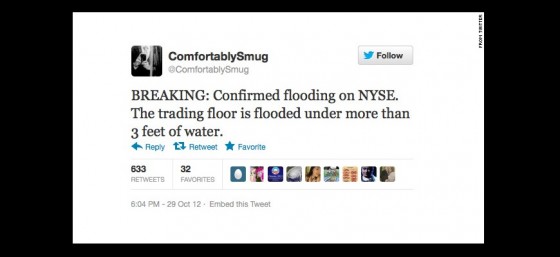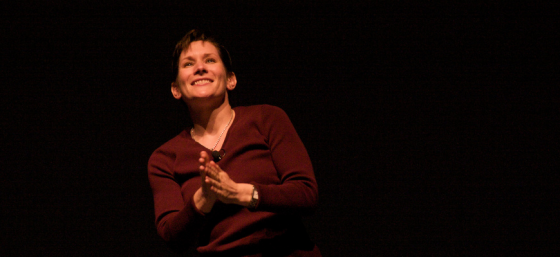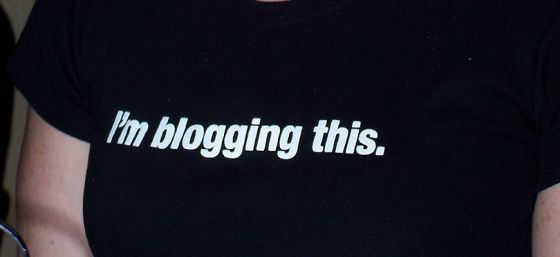 Last week during Hurricane Sandy, many of us turned to Twitter for up-to-the-minute updates about the storm. An anonymous person using the handle @ComfortablySmug made several tweets.
Last week during Hurricane Sandy, many of us turned to Twitter for up-to-the-minute updates about the storm. An anonymous person using the handle @ComfortablySmug made several tweets.
- BREAKING: Con Edison has begun shutting down all power in Manhattan
- BREAKING: Governor Cuomo is trapped in Manhattan. Has been taken to a secure shelter
- BREAKING: Confirmed flooding on NYSE. The trading floor is flooded under more than 3 feet of water.
It was later revealed that the information was false, but not before these tweets were retweeted more than 500 times according to reports.
Buzzfeed’s Jack Stuef investigated the situation and determined that the anonymous tweeter was Shashank Tripathi, a campaign manager for Republican congressional candidate Christopher Wight. Tripathi has since resigned from his position and tweeted an apology for posting inaccurate information. That was his latest tweet from that account.
The New York District Attorney’s Office was asked to pursue criminal charges against Tripathi for his irresponsible tweeting. It will be interesting to see if he’s charged.
What Might He Be Charged With?
In many situations, it’s not illegal to lie unless you’re entering realms like fraud or identity theft. I did some digging in the Arizona criminal code and I could see a prosecutor making an argument that a person who posts inaccurate information during an emergency could be charged with electronic harassment, falsely reporting an emergency or causing public panic, creating a hoax, or possibly something along the lines of disorderly conduct.
Some of these crimes, like electronic harassment, require a victim and Tripathi didn’t appear to have a target. I wonder if issues like this might make the prosecution’s job harder.
What About Tripathi’s Right to be Anonymous?
Yes, the First Amendment protects your right to free speech, including your right to speak anonymously. It does not guarantee your anonymity. If you want to be anonymous, you have the responsibility of not making it easy for others to figure out who you are. Apparently @ComfortablySmug was unmasked because he posted censored pictures of himself and the uncensored version was easily discovered and revealed his identity.
If he committed a crime, his right to be anonymous also went out the window.
What do you think should happen to Shashank Tripathi? Should he be charged with a crime for tweeting lies about Hurricane Sandy? Please share your opinion as a comment below.
If you want to learn more about your online dos and don’ts, check out my book The Legal Side of Blogging: How Not to get Sued, Fired, Arrested, or Killed.
You can also connect with me via Twitter, Google+, Facebook, and LinkedIn, or you can email me.
Please visit my homepage for more information about Carter Law Firm.


